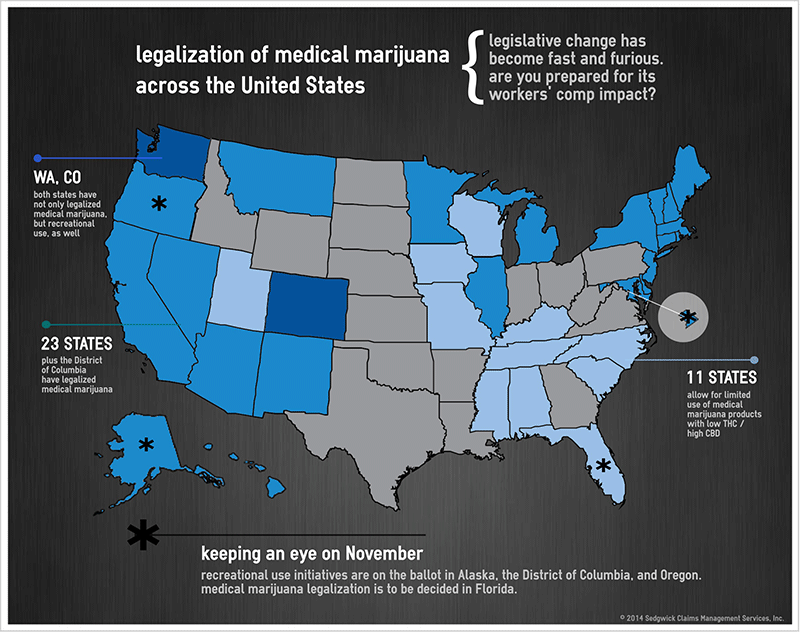When I began discussing medical marijuana as an emerging workers’ compensation issue more than five years ago, it had only been legalized in 12 states. In 2012, Colorado and Washington legalized the sale of marijuana for recreational use. Today, 23 states and the District of Columbia have since legalized medical marijuana with Maryland, Minnesota and New York enacting laws this year.

Eleven states passed laws this year that provide limited access to marijuana products with low tetrahydrocannabinol (THC) and high cannabidiol (CBD). In most of these states, the marijuana product is only available to patients with debilitating epileptic conditions.
In May 2014, in the case Vialpando v. Ben’s Automotive Services, the New Mexico Court of Appeals upheld an order by a workers’ compensation judge that required an employer and its insurance company to reimburse an employee for medical marijuana. It will be interesting to see the precedential value of this particular ruling, however. The employer argued that because marijuana is a controlled substance under federal law that reimbursing its use would essentially cause it to commit a federal crime. The court claimed that the employer did not cite a particular statute it was forced to violate and stated that the court would not look for one. It is probably safe to say that attorneys for employers and insurers will be careful to include this in the future.
Several other states have marijuana initiatives on the upcoming November ballots. If passed, Alaska, District of Columbia and Oregon would allow people age 21 and older to possess small amounts of marijuana and plants for recreational use. The Florida ballot initiative to be decided by voters on November 4, 2014 would legalize medical marijuana for debilitating medical conditions.
The rapid pace of change in state marijuana laws that currently contradict federal law continues to be a source of confusion in this fast-evolving national debate; additionally, there has been activity surrounding the topic within the federal government over the past year. In an interview published January 27, 2014 with The New Yorker magazine, President Obama said that while marijuana is a vice, a waste of time and not very healthy, it is no more dangerous than alcohol.
In May 2014, the U.S. House of Representatives voted 219-189 in favor of an amendment to prohibit the Drug Enforcement Administration (DEA) from investigating, prosecuting and incarcerating those who comply with state medical marijuana laws. This may be the most significant indicator this year of the change in public opinion regarding medical marijuana. There is currently no change in federal law, however, because the amendment – added to HR 4660, the Commerce, Justice, Science and Related Agencies Appropriations Act – has not passed the Senate. Interestingly, the language in the amendment that passed had been previously offered seven times since 2003.
In August 2013, the U.S. Department of Justice (DOJ) updated its federal marijuana enforcement policy that marijuana remains an illegal drug under the Controlled Substances Act (CSA) and that federal prosecutors will continue to enforce this statute. The announcement further indicated that the department would continue to rely on states and local law enforcement agencies to address lower-level marijuana activities by enforcing their own narcotics laws; the DOJ also informed the governors of Colorado and Washington that it was deferring its right to challenge their legalization laws at this time.
There have been multiple attempts to reclassify marijuana under the CSA schedule over the years. Most recently, the Americans for Safe Access petitioned the DEA to reclassify marijuana; the request was rejected, stating a lack of FDA-quality clinical trials confirming the drug’s value in treating medical conditions. Claiming the DEA ignored hundreds of peer-reviewed studies demonstrating marijuana’s efficacy, the Americans for Safe Access sued to overturn the agency’s decision. In January 2013, in Americans for Safe Access, et al v. DEA, the United States Court of Appeals for the District of Columbia Circuit upheld the DEA’s action. In October 2013, the United States Supreme Court rejected a petition to review the ruling.
Given the new report on the dangers and consequences of marijuana abuse, published by the DEA in May 2014, it does not seem likely that this agency will agree to reclassify marijuana in the near future. The report states, “Organizers behind the medical marijuana movement did not really concern themselves with marijuana as a medicine – they just saw it as a means to an end, which is the legalization of marijuana for recreational purposes.”
Whether research such as a multi-institutional study led by researchers at University of Pennsylvania’s School of Medicine will change the DEA’s current position is yet to be seen. In August 2014, a study published in JAMA Internal Medicine found that medical marijuana laws are associated with significantly lower state-level opioid overdose mortality rates; although, it is noted that further investigation is required to determine how medical marijuana laws may interact with policies aimed at preventing opioid analgesic overdose.
In the meantime, the largest paper in the nation has joined the discussion. In July 2014, the editorial board of The New York Times called for the federal government to repeal the ban on marijuana, comparing it to the prohibition of alcohol. What do you think?
Staying informed and developing a company policy to address the use and reimbursement of medical marijuana for on-the-job injuries is important. Are you prepared for legislative changes or an adverse decision like the one in New Mexico? How will changes to marijuana laws impact where you live or your business? Make your voice heard on this issue.
Darrell Brown, Chief Performance Officer